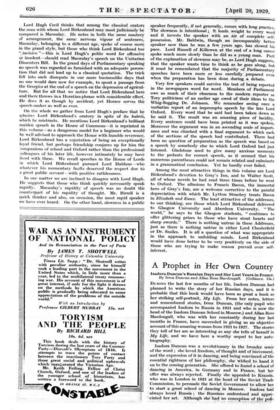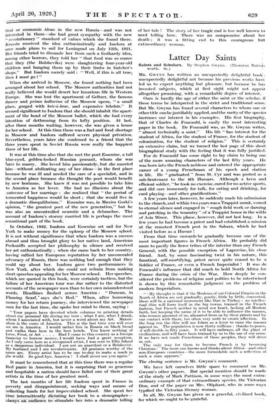A Prophet in Her Own Country
Isadora Duncan's Russian Days and Her Last Years in France. By Irma Duncan and Allan Rosa Macdougall. (Gollancz. 15s.) DURING the last few months of her life, Isadora Duncan had planned to write the story of her Russian days, and it is probable that this book would have been as great a book as her striking self-portrait, My Life. From her notes, letters and remembered stories, Irma Duncan, (the only pupil who accompanied Isadora to Russia in 1921 and who is now the head of the Isadora Duncan School in Moscow,) and Allan Ross Macdougall, who was with her constantly during her last 'months in France, have succeeded in giving us an objective
account of this amazing woman from 1921 to 1927. The stories they tell of her are as interesting as any she tells of herself in My Life, and we have here a worthy sequel to her auto- biography.
Isadora Duncan was a revolutionary in the broader sense
of the word ; 'she loved freedom, of thought and of Movement,
• and the expression of it in dancing, and being convinced of the us essential rightness of het: 'philosophy, she wished to hand it on to the coming generation. She offered to found a school of
• dancing in America, in Germany and in France, but her offer was always rejected. Finally she appealed to Krassin, who was in London in 1921 at the head of the Soviet Trade Commission, to persuade the Soviet Government to allow her to start a great school of dancing in Moscow. Isadora had - always loved Russia ; the -Russians understood and appre- 1 elated her art. Although she' had no conception of the poi- field or economic ideas in the new Russia---and was not interested In them—she had great sympathy with the new "revolutionary " standard of values which she found there. Erassin received the idea enthusiastically and Isadora at once made plans to sail for Leningrad on July 12th, 1921. Her friends tried to dissuade her from such a -foolhardy idea, _among other horrors, they told her " that food was so scarce that they (the Bolsheviks) were slaughtering four-year-old -children and hanging them up by their limbs in butcher's shops." But Isadora merely said : " Well, if this is all true; then I must go ! "
When she arrived in Moscow, she found nothing had been arranged about her school. The Moscow authorities had not really believed she would desert her luxurious life in Western Europe. She was lent the apartment of Geltzer, the famous dancer and prima ballarina of the Moscow opera, " a small place, gorged with brie-&-brae, and expensive bibelots." It seemed significant to Isadora that she should inhabit the apart- ment of the head of the Moscow ballet, which she had every intention of dethroning from its lofty position. At last, after three months waiting, however, she was given a house for her school. At this time there was a fuel and food shortage in Moscow and Isadora suffered severe physical privation. Nevertheless, years later she confessed to a friend that the three years spent in Soviet Russia were really the happiest three of her life.
It was at this time also that she met the poet Essenine, a tall blue-eyed, golden-locked Russian peasant, whom she was later to marry. She loved him passionately, but she married him—without abdicating any of her ideas—in the first place because he was ill and needed the care of a specialist, and in the second place because she thought the poet would benefit by new horizons. She knew it was not possible to take him to America as her lover. She had no illusions about the outcome of her marriage : she realized that " the period of tormented happiness would be short ; that she would live in a dramatic disequilibrium." Essenine was, in Maxim Gorki's opinion, " the greatest poet of the new generation," but he was also an uncontrolled neurotic and a debauchee. The account of Isadora's stormy married life is perhaps the most .sensational part of the book.
In October, 1922, Isadora and Essenine set sail for New York to make money for the upkeep of the Moscow school. It is not without significance that when Isadora was a success abroad and thus brought glory to her native land, American Pecksniffs accepted her philosophy in silence and received her art enthusiastically ; when she came back to her country, having sullied her European reputation by her unconcealed advocacy of Russia, there was nothing bad enough that they could say about her. Isadora gave two performances in New York, after which she could not refrain from making short speeches appealing for her Moscow school. Her speeches, which are quoted in this book, were certainly tactless, but the failure of her American tour was due rather to the distorted accounts of the newspaper men than to her own misunderstood words. Headlines flashed across America : " Duncan, in Flaming Scarf, says she's Red." When, after borrowing money for her return journey, she interviewed the newspaper men for the last time, she spoke her mind to them, saying :
" Your papers have devoted whole columns to printing details about my personal life during my tour ; what I ate, what I drank, whom I associated with, but never a word about my Art. Materi - alism is the curse of America. This is the last time you will ever see me in America. I would rather live in Russia on black bread and vodka than here in the best hotels. You know nothing of Love, Food, or Art, . . . . Had I come to this country as a foreign financier to borrow money, I would have had a great reception. As I only came here as a recognised artist, I was sent to Ellis Island as a dangerous individual. I am not an anarchist or a Bolshevist. My husband and I are revolutionists. All geniuses worthy of the name are. Every artist has to be one to-day to make a mark in the world. So good-bye, America ! I shall never see you again."
It must be remembered that at this time there was a regular Red panic in America, but it is surprising that so generous and hospitable a nation should have failed one of their great artists in the time of her greatest need.
The last months of her life Isadora spent in France in poverty and disappointment, seeking ways and means of collecting funds for her impoverished school. She spent her time intermittently dictating her book to a stenographer-7 always as audience to- stimulate 'her -into a- dramatic telling of her tale ! The story_ of her-tragic end is too well known to need telling here. There was no compromise about her death ; it was a fitting end to this courageous but extraordinary woman.

























































 Previous page
Previous page